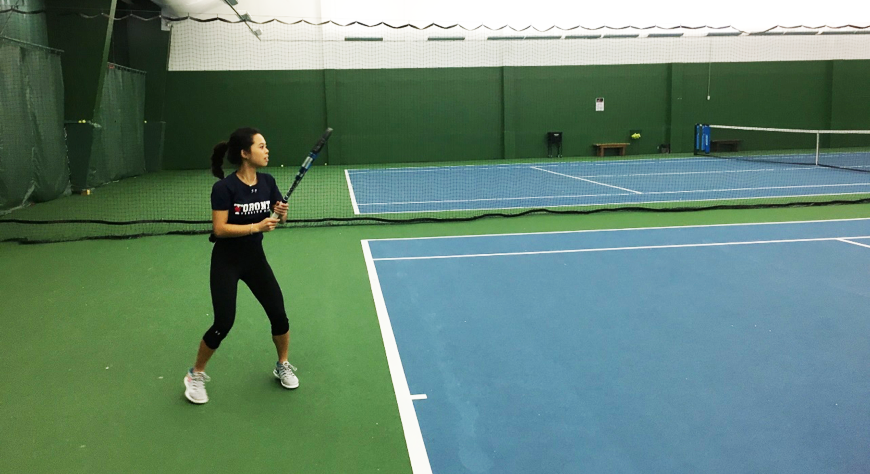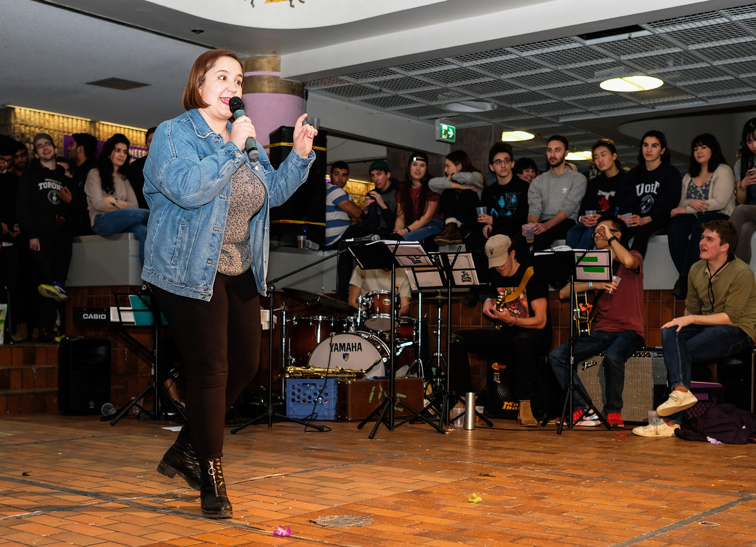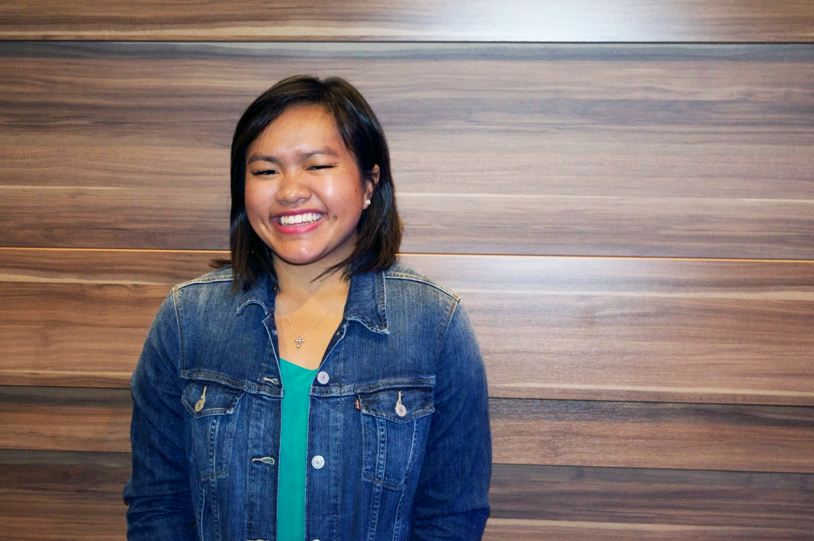Skule™ is busy. And life is even busier. While U of T Engineering students take on important technical challenges — in fields from climate change to advanced manufacturing — some challenges are more personal and closer to home.
Of the 200 engineering students who participated in the University of Toronto’s 2016 National College Health Assessment (NCHA), 57% reported their stress levels were “above average” or “tremendous.” What makes us feel stressed is personal and unique — and so are the supports that can help manage that stress.
“As an Advisor, I hear many students say that they feel they should be successful all on their own,” says Cori Hanson, Assistant Director, Student Experience and Teaching Development for U of T Engineering. “What they don’t always recognize is that tapping into a system of support — including University services, friends, family, faculty and staff — is a big part of being a successful student.” Hanson adds, “Everyone here needs support to be successful. Finding the right balance between school, family, work and friends can help students manage their stress levels.”
As the University of Toronto and the Faculty of Applied Science & Engineering work to improve and expand mental health resources on campus to better serve all students, we sat down with four U of T Engineering students to learn more about what strategies they use to navigate their stress.

The Athlete
Kimberly Lai (Year 4 EngSci) is currently working at Safran Landing Systems as part of the Professional Experience Year Co-op Program. She has also been a member of the Varsity Blues women’s tennis team since first year, and represents her team on the Varsity Blues Board. She also serves as an executive member of Blues Engineering, a student-run organization that provides support to the Faculty’s student-athletes.
“Being a varsity athlete isn’t exactly a walk in the park,” says Lai. “The [Blues Engineering] executive team offers academic support to those who want it, and creates a community where students can connect with others who are experiencing the same things.”
As a student-athlete, Lai finds that physical activity helps her feel more balanced. During a typical day, Lai uses breaks between classes to go to the gym, lift weights or visit a physiotherapist if she’s recovering from an injury, which, she relays, is common. “On the days where I have back-to-back classes, I usually try to squeeze some rest time in in the morning before class or in the evening before dinner. I then spend the rest of my evening studying and completing assignments.”
On days when she has tennis practice, you’ll find her “studying and trying to complete as much work as possible in between classes.” Lai says that she thinks keeping a balance between academics and athletics is extremely important. “You have to know what your priorities are and learn when to say no when there are too many things on your plate.”
Lai keeps a pocket-sized agenda where she writes down all her deadlines and commitments and keeps track of what’s coming up. Every Sunday night, she takes 15 minutes to create a plan that addresses how she will complete all of her assignments and problem sets for the upcoming week.
“I also have a big whiteboard where I write down when I’m going to do each task and how much time I’ll allocate for it. For me, giving myself a time limit and making sure I stick to it has been really helpful. It is so easy to spend an extra five hours on a specific question in one subject and completely disregard all my other subjects.”

The First-Year Student
Elena Pappas (Year 1 ChemE) is the First-year Core 8 Representative for Skule™ Mental Health and Wellness. “I try to get involved with the Skule™ community as much as I can,” she says.
Pappas is also on the cast of Skule™ Nite, a musical and sketch comedy show. She is open about her struggles with mental health, and while she finds creative performance integral in helping her maintain a healthy headspace, it also adds to her busy schedule. “Leading up to a show, I spend 16 hours a week in rehearsal,” she says.
When she’s not in class or rehearsals, Pappas can be found studying in her residence. “I try to do at least three hours of studying per day.” But when she can’t get in a complete three hours, she tries not to stress about it. “It’s super important to get a good night’s rest. Whenever I notice that I’m not doing so great, it’s almost always because I’m not getting enough rest.”
Pappas advises incoming students to maintain perspective by always looking at the bigger picture. “I see a lot of my classmates only focus on studying and worrying about failing a course,” she says. “I’ve learned that excessive stress isn’t worth having if it’s not helping you.”

The International Student
Originally from Chicago, Ill., third-year mechanical engineering student Hannah Eng decided to attend U of T Engineering because of its sense of community. “I feel like I missed out on so many opportunities in high school. I knew I definitely wanted to be more involved coming into university,”she says.
She has served in various positions with the Skule™ Archives and Gradball, acted as a Class Representative, Student Ambassador and much more. Today, Eng is the Engineering Society’s Mental Wellness Director. She and her team plan events and share advice on social media to promote mental well-being among all students.
While her daily schedule varies, Eng finds she works best when she has a regular routine. Even if she doesn’t have an early class, she finds that her 20-minute walk to and from campus is a great way to begin and end her day.
Between classes, she usually spends time in the computer lab with friends where they can work on problem sets, lab work or study for an upcoming quiz. “If it’s a three- or four-hour break, we might go skating or visit Hart House gym. Occasionally, I’ll have some meetings with faculty, a professor, or a club team meeting during these breaks.”
Her evenings are spent studying, doing homework or attending club meetings and events or going to the gym. “I have found exercise to be a great de-stressor for me. I try to plan ahead and make time to go for an hour at least twice a week.”
When asked how students can improve their mental health, Eng offered some candid advice. “Get to know yourself and forgive yourself. The best self-care is what works for you. It took me a while of testing out how I like to study, how I like to de-stress, and I’m still finding what does and doesn’t work.”

The Graduate Student
Currently in the second year of his PhD studies in the Institute of Biomaterials & Biomedical Engineering, Chaim Katz completed both his undergraduate and master’s degrees at U of T Engineering. “I research memory formation and its correlation to ongoing electrical activity in the brain,” he says.
For Katz, enjoying and finding meaning in his work is important to his mental health, and makes spending long hours in the lab a lot easier. “As a lab group, we collaborate and participate in outreach initiatives that directly connect us to those our research is intended to support – the epilepsy community,” he says.
Katz’s lab environment allows him the flexibility to manage his own schedule. While each day brings different responsibilities and challenges, he finds the packed schedule keeps him motivated and allows him to switch mindsets so that he is not always focused on one project. “At night, or at least on Saturdays, I try to carve out some time with my wife, family and friends to ensure I am not solely engulfed in my work,” he says.
A co-founding member of the Graduate Engineering Council of Students (GECoS) and a member of the Biomedical Engineering Students Association, Katz maintains work-life balance through physical activities like floor hockey and inner tube water polo, but he also leaves room to spend quality time with friends and family. Katz notes that being involved in sports keeps him healthy and active while giving him an energy boost to be more productive in his research. Living downtown means he can bike to the lab, giving him some physical activity every morning.
“The importance of my extracurriculars and life outside of my research cannot be understated,” says Katz. His commitments and involvement encourages him to be especially efficient with his time.
During his undergraduate degree, Katz focused on fulfilling the requirements of structured courses. “My responsibilities included being a good student and assisting other students maintain work-life balance through my work as a residence advisor,” he says.
Now, as a graduate student, he thinks more about fostering a graduate community where everyone can learn and grow together from their experiences. “In graduate school, sometimes you feel more alone since you are solely responsible for your unstructured project and its outcomes, and sometimes you are left to your own devices to succeed. However, you always need to remember that you are surrounded by a community that understands what you’re going through. You are not alone.”
“There is no ‘one-size-fits-all’ in life. There will be challenging, late nights. But dedicated time for extracurriculars — regardless how you choose to spend that time — is critical to a healthy and balanced life.”
Support and Resources for U of T Engineering Students
Engineering students seeking support for academic or financial concerns should visit the Registrar’s Office in the Galbraith Building (GB157).
Visit the Skule™ Mental Health and Wellness page for information on upcoming events and initiatives organized by engineering students for engineering students.
All U of T students can access counselling services at Health and Wellness in the Koffler Centre (416-978-8030).
Students also have access to Good 2 Talk (1-866-925-5454). This is a free service for post-secondary students in Ontario, and it is available 24 hours a day, 7 days a week. Good 2 Talk is a free, confidential helpline providing counselling and referrals. Good 2 Talk is staffed by trained therapist and counsellors.
For students wanting to speak with someone after hours, there are Crisis Workers available at the Gerstein Centre 24/7 (416-929-5200). There is also a Distress Centre available at 416-408-HELP (4357). The Center for Addiction and Mental Health is also open 24/7 at 250 College Street. (Map)




